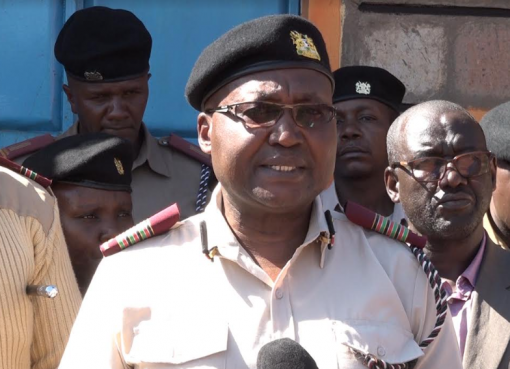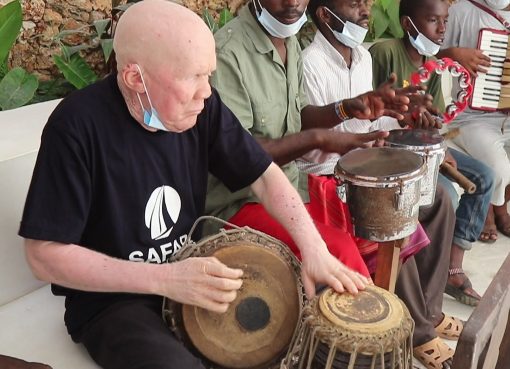The government launched a national mass vaccination campaign targeting sheep and goats to combat Peste des Petits Ruminants (PPR), a highly contagious viral disease in the country.
The launching ceremony was held at Syokithumbi in Kwa Mutonga, Kitui West sub county, bringing together key stakeholders in the livestock sector, including government officials, veterinary professionals and representatives from international organizations.
While speaking during the ceremony, Livestock Development PS Jonathan Mueke, underscored that the livestock sector is a crucial component of Kenya’s economy, contributing up to 12 percent of the GDP and employing half of the agricultural labor force.
“Livestock, including 22 million cattle, 63 million sheep and goats, 3 million camels and 1.8 million donkeys, forms the backbone of livelihoods for many rural communities, particularly in the arid and semi-arid lands (ASALs), where 10 million Kenyans depend on livestock,” said Mueke.
The PS also added that sheep and goats, often referred to as small stock, play a vital role by providing livelihoods, income, employment, and export earnings.
However, the sector faces significant challenges such as diseases, pests, adverse climatic conditions, and market access issues.
He further lamented that transboundary diseases like foot and mouth disease, Rift Valley fever, anthrax, and PPR cause substantial economic losses due to high mortality rates, treatment costs and poor animal health.
“PPR, also known locally as “sotoka ya mbuzi,” is particularly devastating. The disease was first reported in Kenya in 2006 in Turkana and has since caused severe outbreaks, primarily affecting the ASAL regions. PPR not only threatens the health of small ruminants, but also poses a risk to some wild animals, further complicating control efforts,” regretted the PS.
Mueke observed that to combat the severe impact of PPR on food security, rural livelihoods, and the economy, a global strategy for its eradication has been developed and adopted in Kenya.
He noted that the strategy aims to control and eradicate PPR by 2027, emphasizing the reduction of other priority small ruminant diseases (SRDs). The economic impact of PPR is significant, with the annual losses in the ASAL counties estimated at Sh1.67 billion in 2016.
“The control of disease, restricts access to lucrative markets for livestock and livestock products due to trade-sensitive restrictions imposed to prevent its spread. These restrictions hinder the movement of small ruminants and their products, affecting the economic well-being of pastoralist communities reliant on livestock,” Mueke said.
He said the Kenya Kwanza government’s BETA Agenda includes improving the meat value chain, recognizing the importance of sheep and goats in the rural economy and their contribution to the popular Nyama Choma joints across the country.
To support this agenda, the State Department for Livestock Development is rolling out a nationwide vaccination campaign against PPR, with 700,000 doses allocated to Kitui County to vaccinate all sheep and goats.
The PS called upon all stakeholders to unite in the fight against PPR, urging for a collective effort to eradicate the disease. The launch of vaccination campaign aims to safeguard the livelihoods of pastoralist communities and ensure food security by maintaining healthy livestock populations.
Mueke acknowledged VSF Germany and the World Organisation for Animal Health (WOAH) for their contributions to this critical initiative, appreciating that the involvement of these development partners underscores the collaborative effort needed to tackle PPR effectively.
“As the campaign progresses, it is expected to cover more regions, bringing Kenya closer to the goal of eradicating PPR by 2027. The nationwide vaccination drive against PPR is a vital move towards ensuring the stability and growth of Kenya’s livestock sector,” said the PS.
He also noted that the livestock vaccination campaign, highlights the government’s commitment to addressing the challenges faced by the sector and enhancing the well-being of communities’ dependent on livestock for their livelihood.
Small ruminants, with their short reproductive cycle, act as a form of short-term savings for many pastoralist communities, allowing them to convert livestock into cash quickly to cover both planned and emergency expenses. The socio-economic losses associated with PPR, resulting from high case fatality rates, thus threatens this financial stability.
He explained that PPR’s impact extends beyond immediate economic losses, affecting food security and nutrition in rural areas. By reducing the number of healthy livestock, the disease undermines the ability of households to provide for themselves and their families.
This makes the vaccination campaign not only a livestock health issue but a broader socio-economic concern.
The vaccination campaign also aims to improve market access for livestock products by reducing the prevalence of trade-sensitive diseases.
This could lead to increased economic opportunities for pastoralists, allowing them to benefit more fully from their livestock.
Eradicating PPR by 2027 is a challenging, but achievable goal. It requires sustained effort and collaboration between government entities, international organizations, and local communities. The strategy for eradication includes not only vaccination, but also improved surveillance, diagnostics, and response mechanisms.
The PS, advised that Community engagement is crucial for the success of the vaccination campaign.
Educating pastoralists about the importance of vaccination and ensuring their cooperation can help achieve widespread immunity in sheep and goat populations. This community-driven approach enhances the sustainability of the campaign’s outcomes.
The success of this vaccination drive can serve as a model for addressing other transboundary diseases affecting livestock in Kenya. By building robust systems for disease control, Kenya can improve the overall health of its livestock and increase the resilience of its agricultural sector.
Meanwhile, continued support from international partners like VSF Germany and WOAH will be essential. Their expertise and resources can help fill gaps in local capacities and ensure that the campaign is implemented effectively and efficiently.
As the campaign gains momentum, Mueke was optimistic that the positive impacts will be felt not only in Kitui County, but also across all the other regions affected by PPR.
He maintained that protecting small ruminants is a step towards building a more secure and prosperous future for Kenya’s rural communities.
Kitui Chief Officer for Livestock and Apiculture, Jonathan Kyambi, stated the county government’s dedication to improving livestock breeds and overall agricultural output, which is in line with Governor Dr. Julius Malombe’s 16-sector development plan.
“Our goal is to support farmers by providing superior livestock breeds and the necessary resources to boost their livelihoods. This vaccination campaign is a crucial component of this initiative,” Kyambi said.
He noted that the launch of the PPR vaccination campaign represents a significant milestone in Kenya’s efforts to enhance livestock health and secure rural livelihoods.
It is a call to action for all stakeholders to work together towards a common goal, aimed at eradicating PPR and supporting the development of a vibrant, resilient livestock sector.
By Denson Mututo and Brian Kaleso




